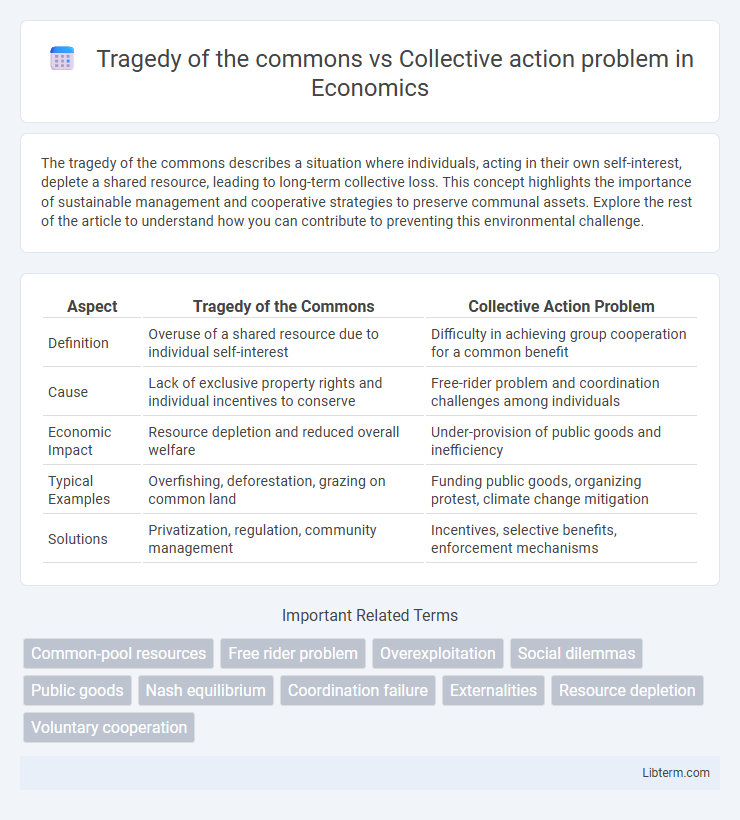The tragedy of the commons describes a situation where individuals, acting in their own self-interest, deplete a shared resource, leading to long-term collective loss. This concept highlights the importance of sustainable management and cooperative strategies to preserve communal assets. Explore the rest of the article to understand how you can contribute to preventing this environmental challenge.
Table of Comparison
| Aspect | Tragedy of the Commons | Collective Action Problem |
|---|---|---|
| Definition | Overuse of a shared resource due to individual self-interest | Difficulty in achieving group cooperation for a common benefit |
| Cause | Lack of exclusive property rights and individual incentives to conserve | Free-rider problem and coordination challenges among individuals |
| Economic Impact | Resource depletion and reduced overall welfare | Under-provision of public goods and inefficiency |
| Typical Examples | Overfishing, deforestation, grazing on common land | Funding public goods, organizing protest, climate change mitigation |
| Solutions | Privatization, regulation, community management | Incentives, selective benefits, enforcement mechanisms |
Understanding the Tragedy of the Commons
The Tragedy of the Commons illustrates how individuals, acting independently and rationally according to their self-interest, deplete shared resources, leading to collective ruin. This concept highlights the conflict between personal gain and the sustainability of common goods such as fisheries, pastures, or clean air. Understanding this phenomenon is crucial for devising effective collective action strategies that regulate usage and promote cooperation.
Defining the Collective Action Problem
The Collective Action Problem arises when individuals face incentives to act in their own self-interest, leading to suboptimal outcomes for the group despite shared goals. It involves difficulties in coordinating efforts and contributions to achieve a common benefit, especially when monitoring and enforcement are costly or impractical. This problem is closely related to the Tragedy of the Commons, where shared resources are overused because individuals prioritize immediate personal gain over collective sustainability.
Key Differences Between Tragedy of the Commons and Collective Action Problems
The Tragedy of the Commons centers on individuals overusing a shared resource, leading to its depletion, while Collective Action Problems involve difficulties in coordinating group efforts for a common benefit despite shared interests. In the Tragedy of the Commons, the conflict arises from individual incentives overriding communal well-being, whereas Collective Action Problems stem from challenges in organizing and motivating participants. Key differences also lie in resource nature; Tragedy of the Commons typically involves finite, rivalrous resources, while Collective Action Problems may involve public goods and non-excludable benefits.
Historical Context and Origins
The Tragedy of the Commons, first articulated by Garrett Hardin in 1968, traces its roots to 19th-century economic theories addressing the overuse of shared resources like common grazing lands. The Collective Action Problem, examined extensively by Mancur Olson in the 1960s, emerged from the study of public goods and collective behavior in economics and political science. Both concepts originated to explain challenges in managing shared resources but differ in focus: the Tragedy of the Commons highlights resource depletion, while the Collective Action Problem emphasizes the difficulty in coordinating group cooperation.
Real-World Examples of Commons Tragedies
The Tragedy of the Commons illustrates how individuals exploiting shared resources, such as overfishing in the world's oceans or deforestation in the Amazon rainforest, deplete these resources to the detriment of all. The Collective Action Problem arises when groups fail to coordinate efforts to manage resources sustainably, evident in global climate change negotiations where nations struggle to agree on emission reductions. Both concepts highlight challenges in managing common-pool resources, underscoring the need for cooperative governance and effective policy frameworks.
Collective Action in Practice: Successes and Failures
Collective action problems emerge when individuals face incentives to act in their own interest despite the long-term benefits of cooperation, as seen in managing public resources and addressing climate change. Successful collective action often relies on clear communication, trust-building mechanisms, and effective institutional frameworks, exemplified by community-managed fisheries and local water governance systems. Failures typically occur due to lack of accountability, free-rider issues, and insufficient enforcement, resulting in resource depletion and breakdowns in cooperation.
Motivations and Incentives in Group Behavior
The tragedy of the commons arises when individuals, motivated by personal gain, overexploit shared resources without accounting for long-term collective consequences, highlighting a misalignment of individual incentives and group welfare. In contrast, the collective action problem focuses on the difficulty of motivating individuals to contribute to a public good due to free-rider incentives, where personal effort yields benefits that others may enjoy without cost. Both dilemmas emphasize the critical role of designing effective incentives and fostering cooperative behavior to overcome conflicts between self-interest and the group's sustainability.
Solutions and Policy Approaches
Addressing the tragedy of the commons and collective action problems requires governance strategies that promote sustainable resource management through regulatory frameworks, such as quotas or usage fees, and incentivize cooperation among stakeholders. Policies incorporating community-based management, privatization, or tradable permits enhance accountability and align individual interests with collective welfare. Institutional solutions fostering trust and communication further mitigate free-rider issues and encourage equitable participation in shared resource conservation.
Role of Governance and Institutions
Governance and institutions play a crucial role in resolving the tragedy of the commons by establishing clear property rights, enforcing regulations, and facilitating cooperation among resource users. Effective institutions create mechanisms for monitoring, sanctioning overuse, and promoting sustainable management, which are essential to overcoming the collective action problem. Strong governance structures enable alignment of individual incentives with collective goals, preventing resource depletion and ensuring long-term resource availability.
Future Directions for Managing Shared Resources
Future directions for managing shared resources emphasize integrating community-based governance with adaptive management techniques to address both the tragedy of the commons and collective action problems. Leveraging digital platforms and blockchain technology enhances transparency and accountability, fostering cooperation among stakeholders in managing environmental assets. Emphasizing the development of interdisciplinary policies that align economic incentives with ecological sustainability promotes long-term resource conservation and equitable access.
Tragedy of the commons Infographic

 libterm.com
libterm.com